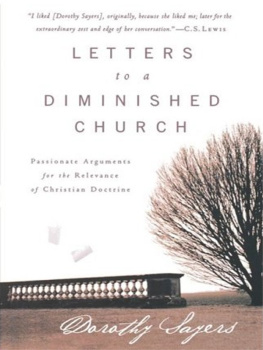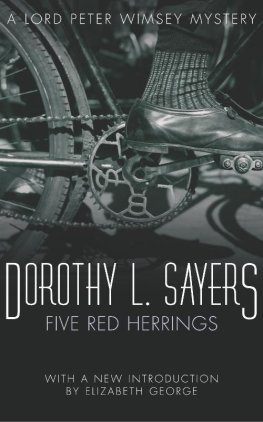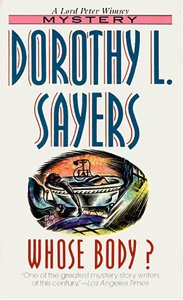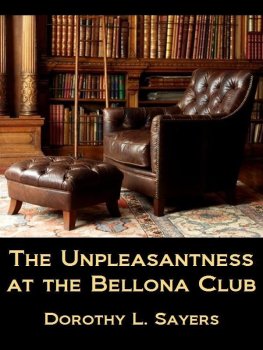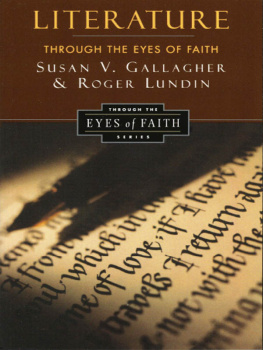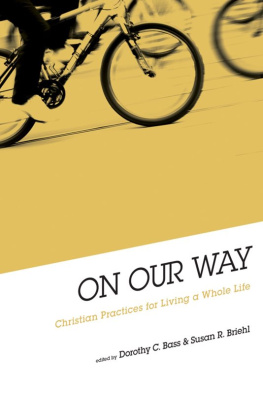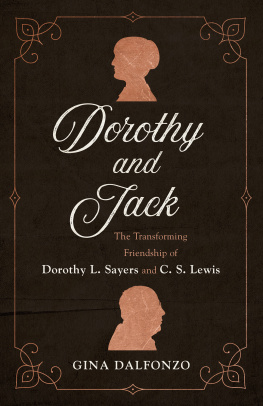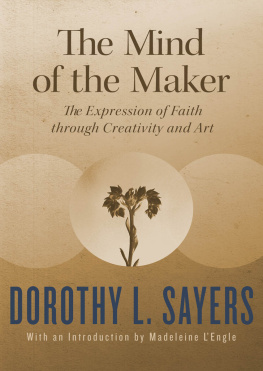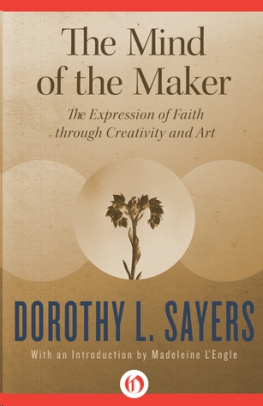LETTERS
to a
DIMINISHED
CHURCH
Passionate Arguments
for the Relevance
of Christian Doctrine
Dorothy L. Sayers

Copyright 2004 by W Publishing Group, a division of Thomas Nelson, Inc.
Published in association with Watkins/Loomis Agency, Inc., and David Higham Associates, Ltd.
All rights reserved. No portion of this publication may be reproduced, stored in a retrieval system, or transmitted in any form by any meanselectronic, mechanical, photocopy, recording, or any otherexcept for brief quotations in printed reviews, without the prior written permission of the publisher.
Library of Congress Cataloging-in-Publication Data
ISBN 0-8499-4526-7
Printed in the United States of America
04 05 06 07 08 PHX 5 4 3 2 1
CONTENTS
THE GREATEST
DRAMA EVER
STAGED
IS THE OFFICIAL CREED
OF CHRISTENDOM
O fficial Christianity, of late years, has been having what is known as a bad press. We are constantly assured that the churches are empty because preachers insist too much upon doctrinedull dogma as people call it. The fact is the precise opposite. It is the neglect of dogma that makes for dullness. The Christian faith is the most exciting drama that ever staggered the imagination of manand the dogma is the drama.
That drama is summarized quite clearly in the creeds of the Church, and if we think it dull it is because we either have never really read those amazing documents or have recited them so often and so mechanically as to have lost all sense of their meaning. The plot pivots upon a single character, and the whole action is the answer to a single central problem: What think ye of Christ? Before we adopt any of the unofficial solutions (some of which are indeed excessively dull)before we dismiss Christ as a myth, and idealist, a demagogue, a liar, or a lunaticit will do no harm to find out what the creeds really say about him. What does the Church think of Christ?
The Churchs answer is categorical and uncompromising, and it is this: that Jesus Bar-Joseph, the carpenter of Nazareth, was in fact and in truth, and in the most exact and literal sense of the words, the God by whom all things were made. His body and brain were those of a common man; his personality was the personality of God, so far as that personality could be expressed in human terms. He was not a kind of demon pretending to be human; he was in every respect a genuine living man. He was not merely a man so good as to be like God he was God.
Now, this is not just a pious commonplace; it is not a commonplace at all. For what it means is this, among other things: that for whatever reason God chose to make man as he islimited and suffering and subject to sorrows and deathhe [God] had the honesty and the courage to take his own medicine. Whatever game he is playing with his creation, he has kept his own rules and played fair. He can exact nothing from man that he has not exacted from himself. He has himself gone through the whole of human experience, from the trivial irritations of family life and the cramping restrictions of hard work and lack of money to the worst horrors of pain and humiliation, defeat, despair, and death. When he was a man, he played the man. He was born in poverty and died in disgrace and though it well worthwhile.
Christianity is, of course, not the only religion that has found the best explanation of human life in the idea of an incarnate and suffering god. The Egyptian Osiris died and rose again; Aeschylus in his play, The Eumenides, reconciled man to God by the theory of a suffering Zeus. But in most theologies, the god is supposed to have suffered and died in some remote and mythical period of prehistory. The Christian story, on the other hand, starts off briskly in St. Matthews account with a place and date: When Jesus was born in Bethlehem of Judea in the days of Herod the King. St. Luke, still more practically and prosaically, pins the thing down by a reference to a piece of government finance. God, he says, was made man in the year when Caesar Augustus was taking a census in connection with a scheme of taxation. Similarly, we might date an event by saying that it took place in the year that Great Britain went off the gold standard. About thirty-three years later (we are informed), God was executed, for being a political nuisance, under Pontius Pilatemuch as we might say, when Mr. Johnson-Hicks was Home Secretary. It is as definite and concrete as all that.
Possibly we might prefer not to take this tale too seriously there are disquieting points about it. Here we had a man of divine character walking and talking among usand what did we find to do with him? The common people, indeed, heard him gladly; but our leading authorities in Church and State considered that he talked too much and uttered too many disconcerting truths. So we bribed one of his friends to hand him over quietly to the police, and we tried him on a rather vague charge of creating a disturbance, and had him publicly flogged and hanged on the common gallows, thanking God we were rid of a knave. All this was not very creditable to us, even if he was (as many people thought and think) only a harmless, crazy preacher. But if the Church is right about him, it was more discreditable still, for the man we hanged was God Almighty.
So that is the outline of the official storythe tale of the time when God was the underdog and got beaten, when he submitted to the conditions he had laid down and became a man like the men he had made, and the men he had made broke him and killed him. This is the dogma we find so dull this terrifying drama of which God is the victim and hero.
If this is dull, then what, in Heavens name, is worthy to be called exciting? The people who hanged Christ never, to do them justice, accused him of being a boreon the contrary, they thought him too dynamic to be safe. It has been left for later generations to muffle up that shattering personality and surround him with an atmosphere of tedium. We have very efficiently pared the claws of the Lion of Judah, certified him meek and mild, and recommended him as a fitting household pet for pale curates and pious old ladies. To those who knew him, however, he in no way suggests a milk-and-water person; they objected to him as a dangerous firebrand. True, he was tender to the unfortunate, patient with honest inquirers, and humble before heaven; but he insulted respectable clergymen by calling them hypocrites. He referred to King Herod as that fox; he went to parties in disreputable company and was looked upon as a gluttonous man and a winebibber, a friend of publicans and sinners; he assaulted indignant tradesmen and threw them and their belongings out of the temple; he drove a coach- and-horses through a number of sacrosanct and hoary regulations; he cured diseases by any means that came handy, with a shocking casualness in the matter of other peoples pigs and property; he showed no proper deference for wealth or social position; when confronted with neat dialectical traps, he displayed a paradoxical humor that affronted serious-minded people, and he retorted by asking disagreeably searching questions that could not be answered by rule of thumb. He was emphatically not a dull man in his human lifetime, and if he was God, there can be nothing dull about God either. But he had a daily beauty in his life that made us ugly, and officialdom felt that the established order of things would be more secure without him. So they did away with God in the name of peace and quietness.
And the third day he rose again. What are we to make of this? One thing is certain: if he were God and nothing else, his immortality means nothing to us; if he was man and no more, his death is no more important than yours or mine. But if he really was both God and man, then when the man Jesus died, God died too; and when the God Jesus rose from the dead, man rose too, because they were one and the same person. The Church binds us to no theory about the exact composition of Christs Resurrection Body. A body of some kind there had to be since man cannot perceive the Infinite otherwise than in terms of space and time. It may have been made from the same elements as the body that disappeared so strangely from the guarded tomb, but it was not that old, limited mortal body, though it was recognizably like it. In any case, those who saw the risen Christ remained persuaded that life was worth living and death a trivialityand attitude curiously unlike that of the modern defeatist, who is firmly persuaded that life is a disaster and death (rather inconsistently) a major catastrophe.
Next page
